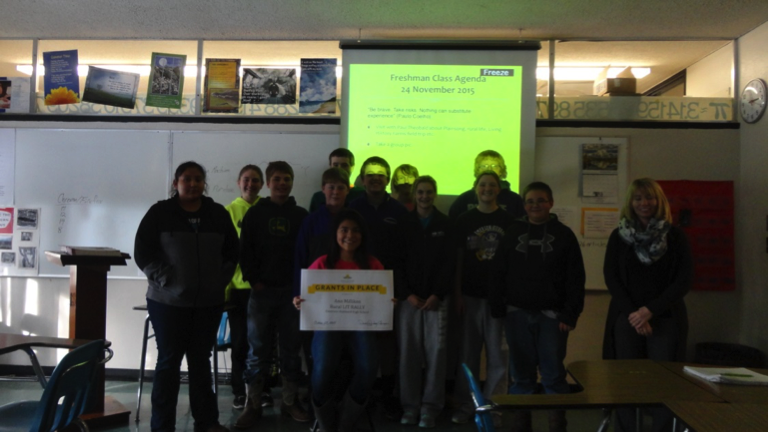Editor's note: The following feature was authored by Paul Theobald, Director, Rural Lit RALLY and Dean, Buena Vista University School of Education and Exercise Science. This is the second story provided by Paul as part of our partnership to produce stories on place-based education.
This past fall, ninth graders at Emerson-Hubbard High School in Emerson, NE, participated in a place-based rural literature lesson with the help of the Grants in Place initiative sponsored by Rural Schools Collaborative.
English instructor, Ms. Ann Milliken, orchestrated the lesson that centered around the award-winning novel, Plainsong, by Kent Haruf. The novel is actually set in eastern Colorado, but the similarities between that location and the Emerson countryside were obvious to students. “Everything discussed in the book, like the way they worked cattle, happens all the time around here,” noted one student. Another agreed, “And everything gets around in a small town. Just like in the book, everyone knows what everyone else is doing.”
In fact, reading a rural novel proved to be an excellent way for students to examine their own rural lives through a different lens. And no attempt was made to gloss over some of the negatives that sometimes accompany rural life. As the group discussed the rough treatment of two small boys at the hands of a high school bully, a female student commented that “I could see that happening around here.” Ms. Milliken added, “Most students were slightly disappointed by the ambiguous ending of the novel. They wanted to know what happened to the characters: whether Russell got into trouble for his bad behavior, what Victoria named her baby, etc., but we all agreed that life is like that. You don’t always get closure.”
After reading and discussing the book, the next step was to allow students to watch the made-for-television movie that was made from the novel. All students seem to agree that it was not nearly as compelling as the book itself. And although the movie started out following the novel quite closely, toward the end, the screenwriters took more liberties, diminishing the quality of the movie in the eyes of most students.
The last phase of the lesson involved a field trip to the living history farms of Des Moines, Iowa. Ms. Milliken used that trip to push students to a deeper analysis of rural life, examining it in what amounted to a “hands on” experience. “I like the way you could travel through time there, simply by walking,” said one student. “You could see the way technological advances over time changed the way rural people lived.”
Tour guides remained “in character,” so that students could converse with farmers, craftsman, and housewives from the past. “Don’t look at these biscuits,” noted one female guide, “they didn’t rise the way they were supposed to.”
As one might expect, the students felt as if they learned the most from the hands on instruction they received on the field trip. “It was a perfect way to flesh out our discussion about rural life, and it gave the students an opportunity to express some pride in their rural heritage,” said Ms. Milliken. “All of the students are grateful for the opportunities made possible by the Grants In Place initiative.”
(Below) Participating students accept their Grants in Place award poster.





